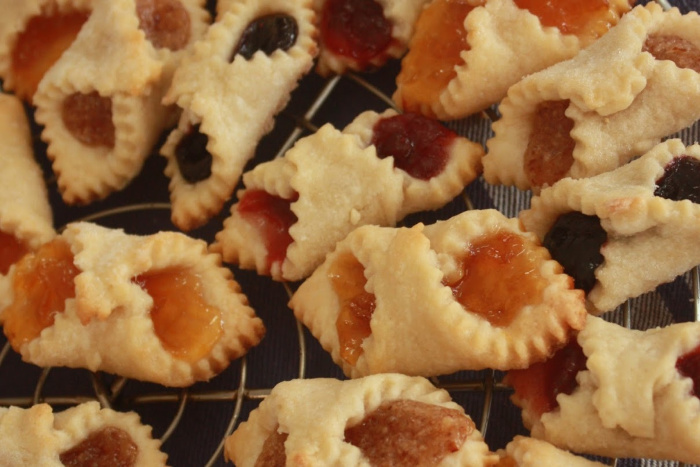
Kolaczki Cookies
(Koe lach' kee - Polish filled cookies)
Ingredients:
8 ounces cream cheese
1 1/2 C butter
1 tsp vanilla extract (or pure vanilla if you have it) *See note #2 below.
4 T sugar
3 C flour
1/2 tsp salt
1 1/2 C filling, such as fruit preserves or jam, nut or poppy seed or any Solo brand filling
1/4 C powdered sugar
Directions:
- Cream the cream cheese and butter until light and fluffy.
- Add vanilla. Stir in flour and salt.
- Wrap in plastic wrap and chill for an hour. Preheat oven to 350.
- Roll out the dough by first dusting the surface (mat or countertop) with granular sugar.
- Roll to 1/8 inch and cut into 2-inch squares. Use a knife or pizza cutter. A fluted pastry cutter creates a zig-zag pattern along the edge of the cookies.
- Place a tsp of filling in the center of each square. Fold over opposite corners and seal well with a dab of water on one corner.
- Bake for 15 minutes or until corners just begin to brown. When cool, dust with powdered sugar.
Note #1: The original recipe for this cookie calls for 1 small packet or 1 T of “vanilla sugar” which is readily available in Europe, but not in the U.S. unless you want to make your own or get it from Amazon! Many “old world” baking products and methods did not travel well with immigrants and they made do with what was available in America. For example, sugar was either very expensive (in the colonies) or rationed (in WWII), so sorghum or maple syrup had to suffice!
Note #2: To make your own fruit filling, combine 3/4 cup dried apricots (or other dried fruit), 1 1/2 cups water, 2 tablespoons sugar, and 1 teaspoon lemon juice in a saucepan. Simmer until the fruit is tender, about 15 minutes. Let it cool and mash or purée with an immersion blender or food processor.
Story:
Father Conrad Targonski, OFM (chaplain at Viterbo University) replied “Kolaczki”, when asked to name his favorite Polish Christmas cookie!
There is a lot of debate as to the origins of kolaczki and different ways to prounounce its name. The Polish claim it, but so do the Slovaks, Croatians, Czechs, Scandinavians and others. To Bohemians, Kolaczki is a sweet pastry like a breakfast roll. For other Eastern Europeans they are round thumb-print style cookies with jam in the middle of the circle. Square, diamond-shaped, or traditional crescent filled as in the recipe above are all sometimes referred to as Kolaczki. The boundaries of Eastern European countries and perhaps their food cultures were shared and fluid, dependent on who was in power! In every case, they are made with pride in tradition and often with stories.
What foods are traditional in your heritage? Why not try them this year at Christmas or Easter or explore the cuisine of another culture in your winter and Easter baking?
If you would like to be notified when we share new recipes, be sure to scroll to the bottom, provide your email address, check the box confirming you are not a robot, click on a few photos to prove it and click subscribe! You will then receive an email after each new post. Remember, we're always looking for new recipes, so keep sending them to ecopact@fspa.org!




Post a Comment